The Roottrees Are Dead review
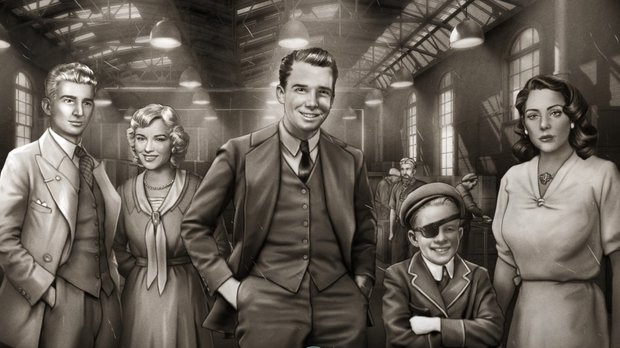
- 0 Comments
Game jam research and deduction mystery lives on in an addictive commercial update grown double in size
Blood is thicker than water…and far less transparent. This is a lesson you’ll learn the hard way in the deduction-based puzzle game The Roottrees Are Dead, in which you take on the role of a private detective hired to lay bare the scandals hidden in the vast branches of a prominent family’s tree, all from the comfort of your now-antiquated computer. It’s an intriguing concept coupled with simple gameplay that cultivates a certain sense of voyeurism as you unearth secrets long thought buried and forgotten. It’s also, at times, a surprisingly tough nut to crack, with a few solutions – particularly nearing the case’s end – requiring especially devious, perhaps bordering on unfair, leaps of logic. Still, those who dig its research-driven premise will burn through it in just a few sittings, especially since the built-in hint system ensures that no one need remain stuck for long.
It’s 1998, and the prominent Roottree Candy Company has tragically lost its leadership – the current president, his wife, and his three daughters – when their private jet crashed. Your services have been retained to look into the remaining family members and establish a comprehensive family tree. It turns out that the company’s founder, Elias Roottree, was a firm believer in the ties that bind, and has set up the corporation so that it divides all its earnings equally between every blood-descended relative, no matter how far removed. With the business empire in upheaval and a veritable fortune up for grabs, it’s essential to establish who, exactly, is entitled to a share of the profits. Armed initially with nothing but a handful of documents and a PC that allows you to surf the internet (barely, via its modern-for-the-times dial-up connection) you begin the task of tracing the Roottree lineage wherever it may lead.
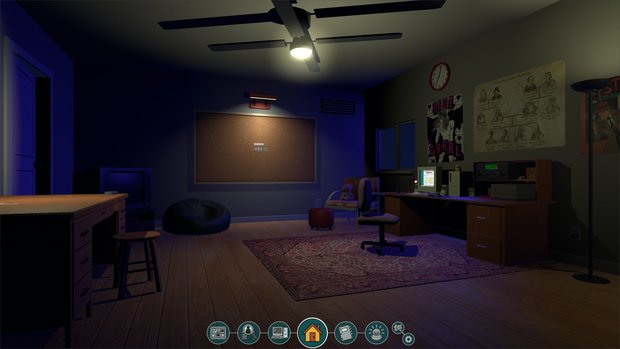
It doesn’t take long for the core gameplay elements to fall into place. Using your in-game web browser, you can enter search commands you’d like to skim the ‘net for. (Your real-life keyboard and mouse are stand-ins for their in-game counterparts here.) As you’re busy digging through your search results, you may come across mentions of various other related topics, including names, places, events, literary references, further websites, and so on. At other times, the information available on the web may be limited, and you’ll need to expand your search via a periodicals database and a digital library catalog, both also available via your PC’s desktop. Actually finding a book, however, requires knowing its full title and author’s name ahead of time, while magazines and newspapers are only added to your database once you’ve actually seen them referenced by name elsewhere. This is how the game expresses its puzzles, apart from a couple of sliding- or rotating-tile puzzles to unscramble a series of photographs, a mechanic that is surprisingly never used again.
Whenever you find an important clue, or at least a reference you’d like to further pursue, you can highlight and copy lines of text directly into your handy notebook, which in turn imbues each annotation with a hyperlink that leads directly back to the source, should you need to reference it later. A helpful additional feature is the ability to write your own notes directly into the notebook, though I preferred going old-school and keeping an actual notepad within reach. Your PC is also coupled with a printer that will automatically produce hard copies of articles and websites when they’re needed, often including visual clues like photographs or magazine covers – the game knows what’s worth printing and what isn’t; you just need to find it first. These physical documents are spread out on a nearby table, and you can toggle between viewing your PC monitor and your evidence spread at the press of a button.
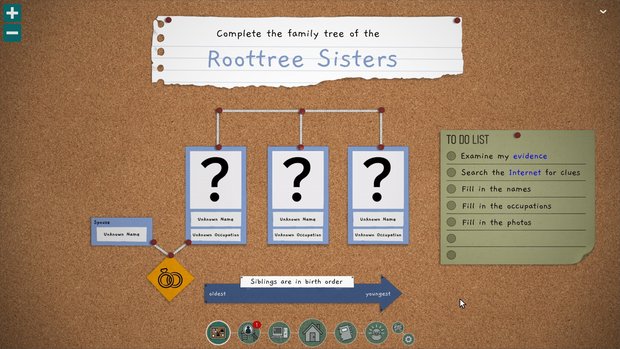
The final area of interest is the jumbo-sized corkboard adorning a wall in your house, hosting the bare-bones outline of the Roottree family tree that you’re working to fill in. Starting with the company’s founding couple at the top and descending downwards over several generations of familial bonds, marriages, name changes, and offspring, the family tree is a vast puzzle left for you to untangle, one revelation at a time. Over the course of your investigation, you’ll need to determine who each individual is, identifying them by name, locating a photograph of them, and filling in their most recent occupation. Only once you’ve correctly identified each Roottree heir (those who simply married into the family are purely optional) will the case end.
Now, being given a set-in-stone outline of the family tree from the get-go is certainly helpful, and while it’s initially a blank slate, every branch of the tree is already firmly defined. This provides you with welcome little details signposting specific facts, like where marriages occurred and how many children they resulted in, all of which are useful for the occasional process of elimination. The game intermittently confirms and locks in any fully (and correctly) completed profiles, indirectly clueing you in on any mistakes you might have made. At first this happens more often, but as you progress this helpful mechanic becomes less frequent. During these moments, the game will also give you a couple of new pointers to continue your investigation, by way of some in-game event or another – a phone call from your mysterious employer or a chance news bulletin on the radio, for example.
This entire case, which should take around 7-8 hours to complete, is only half the story, though, being a revamp of Jeremy Johnston’s 2023 Global Game Jam project. This full commercial remake spearheaded by Robin Ward, however, also includes a special treat: another full-length mystery piggybacked onto the first, picking up a few months after the original case ends and doubling the total playtime. This all new mystery manages to expand a few aspects of the original’s formula, while also adding a bit more challenge, though it’s expected that you’ll have become a seasoned sleuth by this point, so less hand holding only makes sense.
The premise of the second case is largely the same as that of the first: You’re still completing mystery profiles and ultimately identifying legitimate Roottree heirs, except this time you’ve been tasked to unearth those offspring resulting from extramarital affairs – the kind of dirty secrets that people have worked hard to keep under wraps, sometimes for generations. Lifting the veil on these infidelities is, of course, far more difficult, as official records concerning these relationships are in extremely short supply if they exist at all. Moreover, this time you’re only given a handful of documents at the outset of your investigation and are then left to your own devices for the duration, with no intermittent tidbits of helpful information introduced. Still, the second case, dubbed “Roottreemania,” is by and large even more engaging than the first, asking more of you but also giving you more creative freedom to forge your own path ahead.
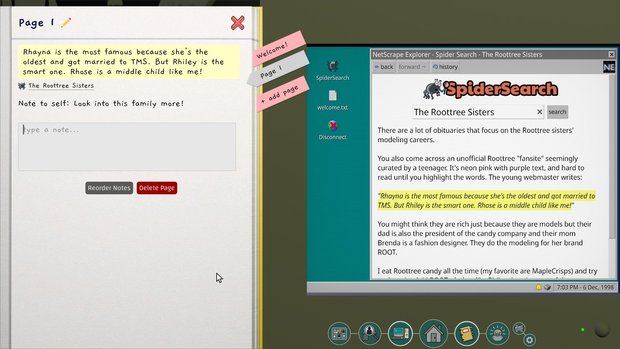
While the initial case has a total of 50 mandatory profiles that must be completed, the second case adds a respectable 32 more profiles to that total. And where the first case had you simply selecting a name for each profile off a list that got shorter and shorter as you identified more Roottrees, the second case leaves no wiggle room for clever guessing. This time you’ll need to choose individual first and last names from a far longer list, including red herrings. In contrast to the previous case’s public-facing family members, this one sees you investigate many individuals who lead low-key lives, are far removed from the family hubbub, and have little to no visible online presence, forcing you to get more creative to dig up any dirt. And yet despite Roottreemania’s greater challenge and lack of assistance, I found its throughline easier to follow, perhaps because each infidelity more or less existed within its own bubble, with little to no overlap to keep track of. It’s a satisfying and natural evolution of the game’s first half, and a great addition to the overall package.
Both cases, once you’ve completed every profile, present you with a final summary of the major events you uncovered, laying them out in a sensible order within a narrative context to bind all the pieces together. Unfortunately, each ending is somewhat undermined by late-stage twists and turns. The initial case recontextualized some characters and events I’d been reading about for the past eight hours after they were already pretty firmly set in my mind, while the latter case piled on a new last-minute requirement that would have necessitated going back to the drawing board with my research just when I was ready for the credits to roll.
Admittedly, these final enigmas are treated as optional (complete with being sealed inside a “Top Secret” envelope until the case has been resolved), but ignoring them after so much sleuthing would have certainly felt like settling for half measures. Still, by that point I found myself uninterested in reopening old wounds, so I opted to use the game’s built-in hint system (which is available anytime) instead, making the endings slightly less satisfying. The system checks what evidence you’ve unearthed and which profiles you haven’t yet locked in, and will provide you with pointers for how to proceed, from subtle nudges to outright answers if you’re persistent. There is no penalty for using this system as much as you like (other than the knowledge that you threw in the towel), and it sure came in handy when I’d had my fun and was ready to put the cases to rest already. I did need it occasionally, though; as rewarding as it was to start from nothing and drill down to the next hidden layer of a trail, there were several clues in each case that had me wondering how anybody would ever stumble upon the right path to finding them.
Though The Roottrees Are Dead is by no means a graphical powerhouse – all the gameplay takes place on three static screens consisting of a PC desktop, a wall-mounted corkboard, and a table – some commendable effort has been put into its sound design. Of particular note are the instances when researching one of the more musically inclined Roottrees turns up a bona fide song recording of theirs, which then adds the full-length song file into your evidence pile to actually listen to. They may not be Grammy winners, but the added production value in having a handful of original songs, ranging in style from ’70s disco to more modern hip hop, was not lost on me. The game’s actual musical score, made up of an array of songs by independent artists, suits its investigative mood and includes plenty of jazz fusion to underscore the whole “gumshoe” motif. We even get a couple of voiced characters, in the form of your clients who offered you the job, including notable voice-over artist Ivy Dupler.
Final Verdict
The Roottrees Are Dead burns fast and bright, the kind of game whose rapid-fire discoveries engender that “just one more” feeling that keeps you glued to your computer monitor: just one more website search, just one more profile locked in. Good thing, too, as you’ll never uncover more than a handful of connected bits of information at a time before hitting a wall and having to divert elsewhere for a while, forcing you to form your picture of the family’s many generations all at once rather than in an orderly fashion. This means that prolonged breaks between playing sessions would probably be detrimental to keeping all the disparate threads organized in your head. While the last-minute twists in both halves turned out to be one straw too many for me (thank goodness for the available hint system!), I had a terrific time nosing around people’s lives and indulging my voyeuristic side from afar, and the fact that the first meaty mystery gives way to a second, equally substantial enigma is just a massive amount of icing on top of an already satisfying adventure cake.
Hot take
Filling in a family tree may not sound all that compelling, but digging up the sordid secrets of a prominent family of celebs is such voyeuristic fun that it’s hard to tear yourself away from The Roottrees Are Dead until not one but two sets of mysteries are solved in this polished and expanded commercial remake.
Pros
- Clever concept takes hold right away and keeps you gripped
- A substantial mystery to sink your teeth into, followed by a second, even more satisfying bonus mystery
- Welcome hint system is there when you need it
- Groovy selection of stylish musical accompaniment (and some original recordings, too!)
Cons
- Unfortunate examples of moon logic for those last few hard-to-find tidbits
- Both cases introduce an (optional but hard-to-ignore) final twist just when they should be ending
Pascal played The Roottrees Are Dead on PC using a review code provided by the game's publisher.







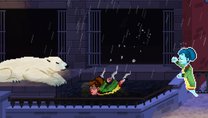


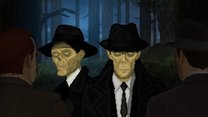
0 Comments
Want to join the discussion? Leave a comment as guest, sign in or register in our forums.
Leave a comment